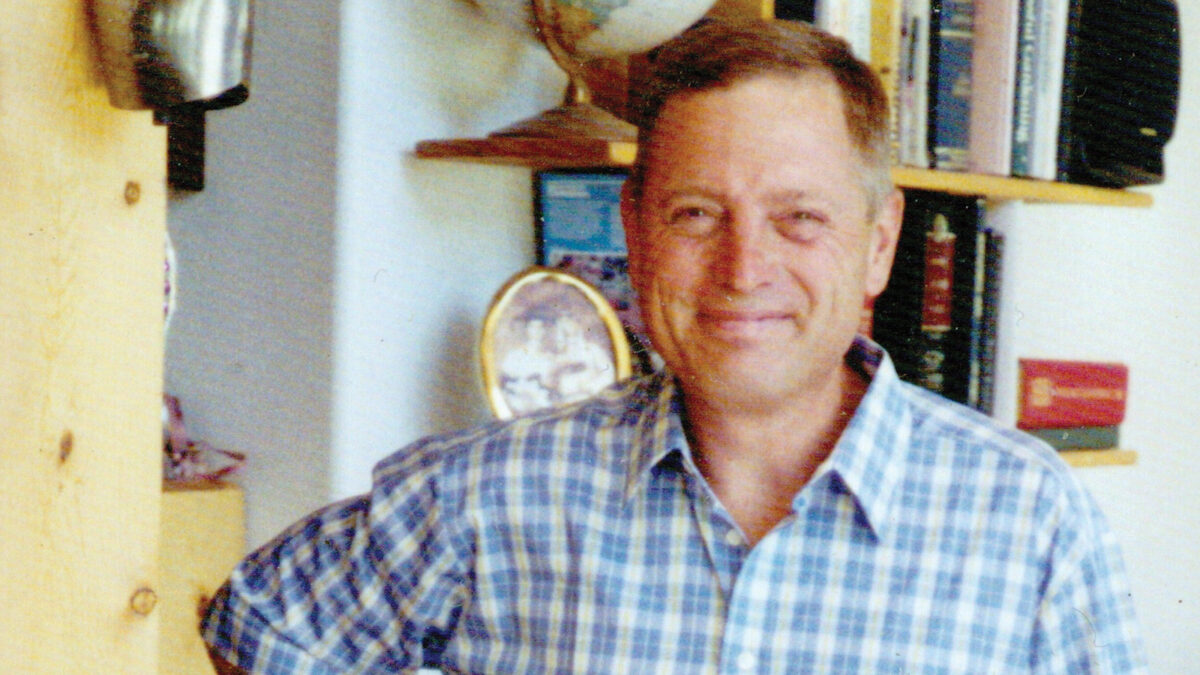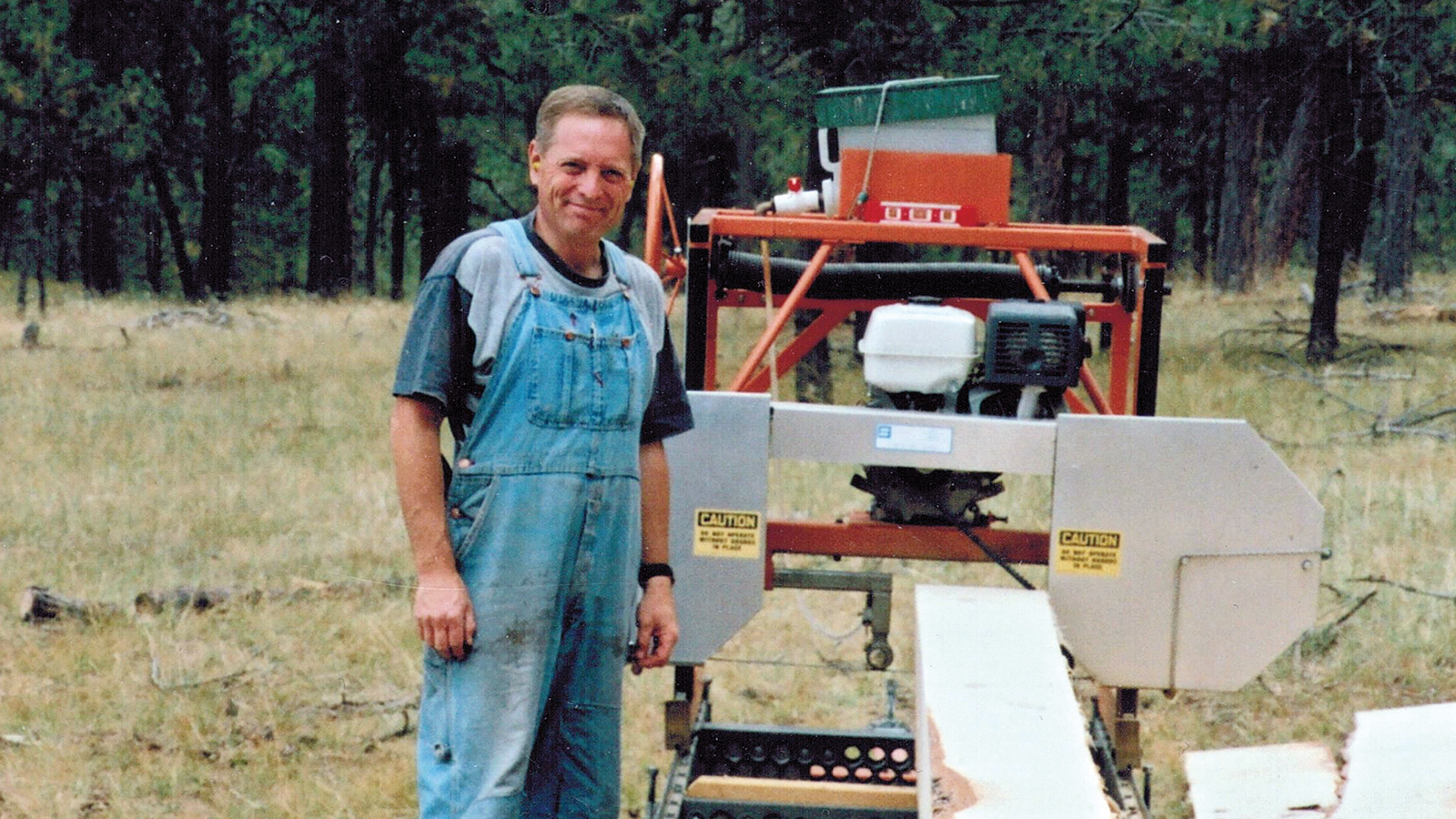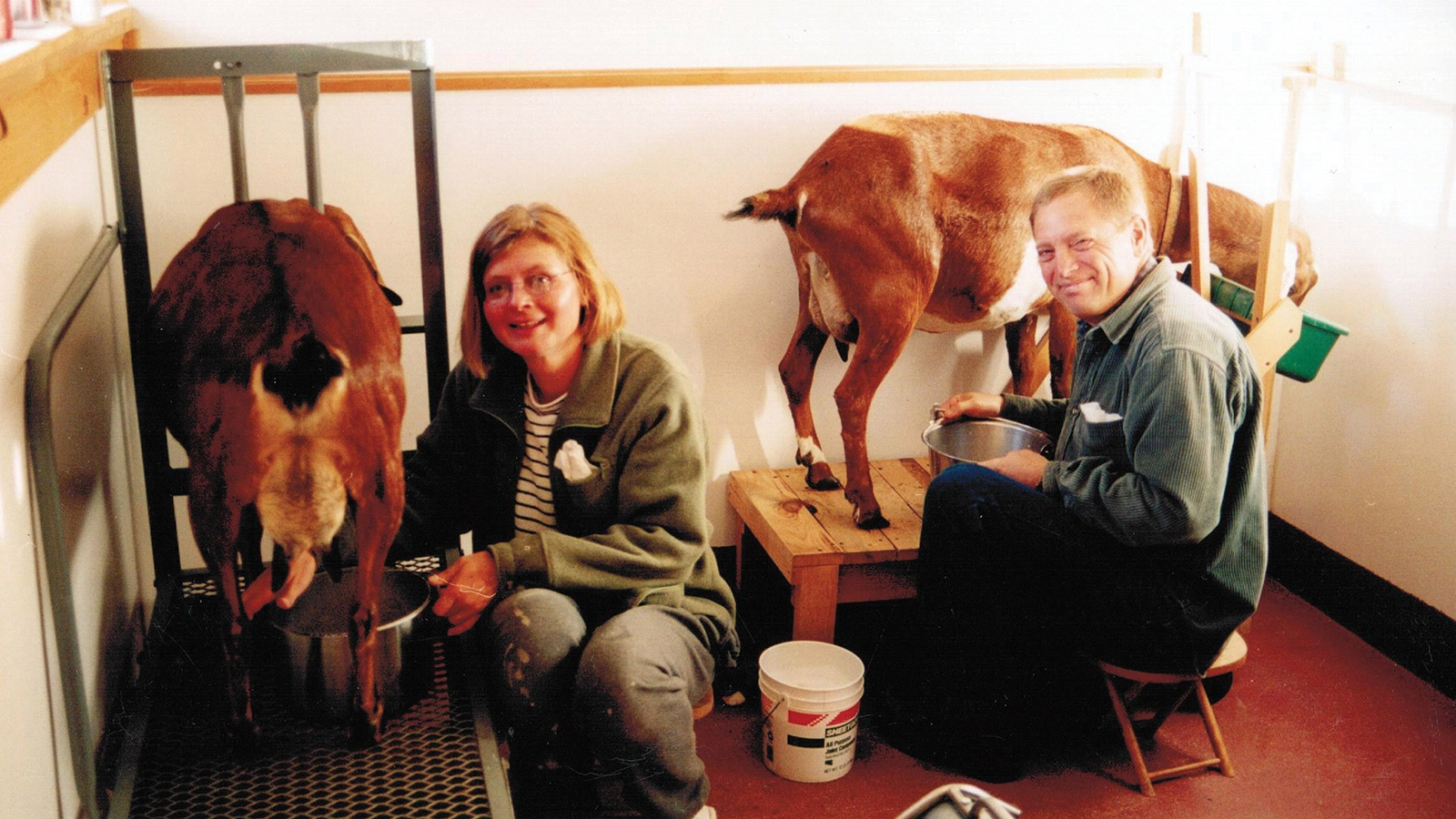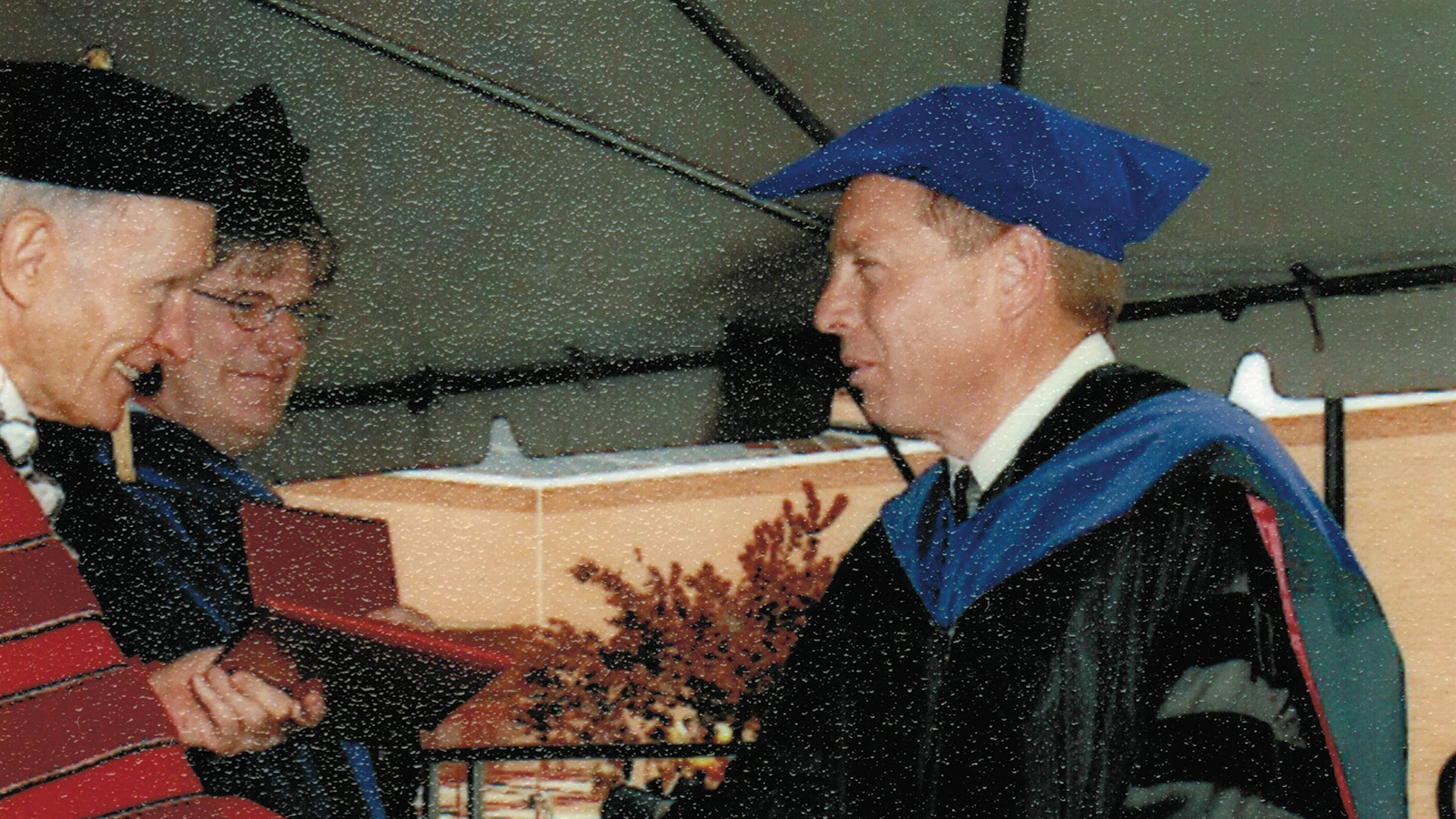
A Tribute to Ric Morgan, Our Access to Justice Hero
June 2024
Download This Article (.pdf)
Ric Morgan, a special Colorado lawyer, passed away suddenly while working in his law office on February 17, 2024. This article about Ric is not just a tribute, though he deserved many tributes for all he contributed to access to justice and to improving the practice of law in Colorado. Ric represented something more. He stood as a validation of the fact that one person can see a seemingly insurmountable problem and without fanfare develop and implement a strategy to tackle it. As one person who worked with him over the years observed: “His life and work are a powerful testament to what one person can do to affect his community and beyond.”1 A member of Colorado’s Access to Justice Commission saw Ric as a “repudiation to the complacency that too many of us have in the profession about the gap between the promise of a society governed by the rule of law and the difficulty of so many of us accessing it. We sometimes feel that the problem is so big and so intractable that we only talk about it and feel like we can’t do anything about it. But Ric just took action to help make that gap smaller.”
Ric was the embodiment of one of Robert F. Kennedy’s favorite quotes: “Some . . . see things as they are, and ask why. I dream of things that never were, and ask why not.”2
What did Ric dream of and create? Over 10 years, practically on his own, he created the Virtual Pro Se Clinic (VPC) program to bring legal help to people throughout Colorado, particularly those in remote rural areas. With the help of a few volunteers and the enthusiastic engagement of 87 public librarians in 46 mostly rural counties, the VPC program brought legal help to more than 14,000 Coloradans who otherwise would have been on their own.
To support the VPC program, Ric created a website called the Checkerboard.3 As Ric explained in a 2020 Colorado Lawyer article, the Checkerboard was created to help users locate court forms, statutes, instructions, court rules, flowcharts, videos, and other free information for over 60 different types of Colorado civil issues.4 Its genius lies in its simplicity: with just a few quick clicks, anyone can get access to hundreds of online resources containing free information on civil legal issues, including online resources from the CBA, Colorado Courts, and Colorado Legal Services. The Checkerboard grew to become a go-to resource for VPC volunteer attorneys, clinic patrons, law librarians, and many other members of the public.
In recent years, Ric also developed a mobile phone app called the Colorado Courts App. Ric described that app as the only phone-based equivalent of a kiosk where an unrepresented litigant can find legal information about a host of legal issues, forms, and instructions for filing or defending a lawsuit, as well as self-help tips to help navigate the court system.
The Two Sides of Ric Morgan
How did Ric accomplish such remarkable achievements essentially on his own? He possessed two very different—some might say very opposite—characteristics. First, he was a fiercely focused engineer who took enormous pride in his ability to identify a problem on his own, figure out the dynamics that caused or perpetuated the problem, and visualize step-by-step and in intricate detail what needed to be done to address it. On the other hand, he was a supremely humble, kind, empathetic, caring, and comforting person. Both attributes, which are not often found in such strong measure in one person, were critical to his ability to create and sustain the VPC program and its supporting technology.
Ric, the Engineer
Ric was a hard-nosed engineer who was totally fearless about his ability to identify and solve problems. A small vignette illustrates this trait: Ric and his wife, Claudia, built their own beautiful house on 80 acres of land in Elbert County. “Built their house” does not mean, as it so often does, paying for an architect, deciding on a design, employing a contractor, and overseeing the work as it unfolds. No, Ric and Claudia built their own house by hand, including buying a small sawmill so they could mill the lumber from the ponderosa pines that they felled on their own property. The house itself is an engineering marvel, built so that in the winter the western sun penetrates fully into the house to warm it, and in the summer, it barely crosses the threshold.
Were Ric and Claudia carpenters with experience that would give them confidence that they could undertake such a task? No. Ric just told Claudia, “It can’t be that hard. We’ll figure out how to do it as we go along.”

Perhaps Ric’s can-do attitude developed in the military. He did not become a lawyer until he was 50. He served for 20 years as an intelligence officer in the US Navy. His assignments read like a compendium of international hotspots over the two decades: the Iran hostage crisis; the Marine barracks bombing in Beirut; the downing of Libyan MIGS off Tobruk, Libya; the Gulf War; Rwandan refugee support; the Balkan War in Bosnia and Croatia; and the 1989 Malta Summit between President Bush and Prime Minister Gorbachev. He ended his military career with the rank of commander serving as deputy commander of the Space and Missile Intelligence Center and then acting chief for the Long-Range Plans Division at the US Space Command at NORAD in Cheyenne Mountain.
Although Ric relied heavily on technology for his design of the VPC program and its support, he was not a technology genius. In fact, he kept all his records for the VPC program in handwritten notes in a tight cursive, kept on cards held together by a rubber band or a large alligator clip. Notwithstanding that surprising commitment to old-fashioned, nondigital recordkeeping, Ric was not at all intimidated about dealing directly with technology companies regarding what he needed to make his vision work. He discovered Zoom years before it became the international backbone of business and family communications during the pandemic; back then, it was a small startup based in California. Ric’s research led him to it, and he decided it would be a better platform than the then-prevalent Skype for working in rural counties with limited broadband and tight budgets. He did not adopt it, however, until he had contacted the company and successfully negotiated changes in its operation to meet the needs of the VPC program.
Similarly, to bring the Colorado Courts App to fruition, he had to design it to work with both the Android and Apple iOS systems, which required negotiating with both to permit a viable interface. In addition, he spent hours on the phone with a software engineer he located in Eastern Europe to program the app at a cost he could afford.
Technologically adept people who have worked with Ric observed his fearless and sometimes impatient problem-solving commitment. One such person noted: “He learned what he needed to learn to do what he needed to do and get it into the world. And he did it. If something needed to be done, he just did it even if he wasn’t the best to do it. He didn’t let the perfect be the enemy of the good.”
A rendition of Ric’s contributions through the VPC program, the Checkerboard, and their supporting technologies should be impressive enough. But he also served for years on the Delivery and the Technology committees of the Access to Justice Commission. In those roles, he helped gather information and communicate the impact of remote hearings on access to the courts for low-income and rural litigants. He also helped both the Access to Justice Commission and Colorado Legal Services obtain the necessary support and funding to create an online portal for people in need of legal assistance.
Ric’s impatience to “get it done” could be daunting, and even annoying, to those used to engaging in lengthy process to decide what to do and to bring people on board. One longtime and successful access to justice lawyer describes how, when she first met Ric, she described her vision for a project to bring services to rural Colorado. She said, Ric got an intense, almost angry look on his face and said: “So why haven’t you done it!” What then kicked in, however, was Ric’s other feature, which was always seeking to be helpful and to suggest ways to improve ideas, concepts, and projects.
Ric, the Gentle and Tireless Humanitarian
In addition to helping keep the country safe for 20 years as a naval intelligence officer, Ric’s military career brought him back to Colorado, where he had gone to college. While still serving, he and Claudia bought their plot of land in Elbert County where Ric planned to raise goats and retire.

His commitment to service that guided him strongly in the military, however, would not let him go. Shortly after he retired, a local church elder approached Ric and suggested that he use his G.I. Bill to go to law school, because the local community needed a lawyer. Ric agreed, enrolled in law school at the University of Denver, and earned his JD in 2003.
What kind of person—who has completed a distinguished career and is embarking on retirement—commits to go to law school so that the local farming community would have a lawyer available? Someone who is extraordinarily caring about others and sees his life as one of service.
Ric was one such person. Early on, Ric became Elbert County’s veterans services officer, helping veterans navigate the complexities of veterans affairs claims, a role that he inhabited for 26 years. Not long after graduating from law school and passing the bar, Ric began to make himself available to answer local community members’ legal questions. Claudia was a member of the local library board and arranged for Ric to meet people in the library to help them with their legal problems. (It was a small community, and the library afforded more discretion than the judicial center.)

Ric’s openness to meet regularly to answer people’s legal questions evolved into a service that in 2010 came to be called “Lawyers at the Library.” On a regularly scheduled night, Ric would be available on a first-come, first-served basis to answer people’s legal questions and suggest steps they could take to address their issues. It was a precursor to the statewide VPC program. Free monthly clinics, with both scheduled Zoom appointments and first-come/first-served walk-ins, have continued to this day at the four Elbert County libraries under the auspices of the 18th Judicial District Access to Justice Committee, which Ric chaired.
Ric first implemented the VPC concept in 2013. He gained the support of three librarians in distant rural counties who made available their computers, their broadband web access, the library facilities, and their desire to help people. For the next 10 years, he added nearly five counties per year and expected to add six more in 2024. Adding distant rural counties involved long road trips that Ric was always willing to make. The librarian in Mesa County recalls fondly how Ric, without a moment’s hesitation, drove the 10-hour round trip from his Elbert County ranch to Grand Junction to help set up the technology to run the clinics in that area.
Appointments were made at 15-minute intervals. Patrons were advised that Ric (and later his volunteers) was not their lawyer but would provide them with legal information and point them in the right direction to address the issues they encountered. One might think that a mere 15-minute interaction with the lawyer would be unsatisfying for the many people seeking help with their legal issues. It is here that Ric’s extraordinary characteristics of kindness, empathy, gentleness, and caring made the difference.
In the course of developing and implementing the VPC program, Ric interacted with literally thousands of people, including the 87 librarians who agreed to host the clinics, the volunteer lawyers who worked with him to assist the clinic patrons, and the thousands of patrons who sought and got help. He also established a footprint with judges in the many judicial districts where he served people.
Ric’s extraordinary humanity was a constant refrain among those who interacted with him:
- A volunteer lawyer, who is herself a leader in the access to justice community in Colorado, noted his remarkable ability to lift people up: “I second-chaired with him for the past three years. . . . I’ve never quite seen anything like it. His ability to listen, reassure, and empower people in distress was almost magical.”
- One of the librarians he worked with echoed the same sentiment: “Getting legal advice is not always pleasant. However, each time someone left a meeting with him, they told me how kind and helpful he was. Everyone left with a smile on their face and a feeling of hope about how to go forward.”
- Another librarian spoke of the impact of his help: “People always left with a next step, if not a path forward. For many, it led to transformative change.”
- Another colleague, who supported his work as the chair of the 18th Judicial District Access to Justice Committee, aptly summarized his caring spirit: “I have always known him to be a beacon of kindness and compassion.”
- Yet another colleague elaborated on his rare combination of talents: “Most often we know when we are in the presence of greatness. That was certainly the case the first time I met Ric. And a sense reinforced, over and over again, each time we met since. . . . He was different. Not just because of his deeply polite way of addressing issues and interacting with humans. But also because of that rare combination of his traits: the wisdom, world experience, deep knowledge of the needs of the people around him, and the burning desire to serve [that] he could not hide.”
- A government official who interacted with Ric shared thoughts about his impact: “Ric Morgan was a blessing on us all. His service was unparalleled. Always kind, direct, and a gentleman. He shared his talents generously. I will miss his wise counsel.”5
- Justice Melissa Hart of the Colorado Supreme Court, who worked as a VPC volunteer attorney before she went on the bench, said simply: “He was so gentle in how he helped people. I have never met anyone who was as good at giving feedback. There are few people I have ever met who were more committed to helping people.”
Where Do We Go From Here?
Ric Morgan’s untimely passing is a giant loss for access to justice in Colorado. Fortunately, however, his legacy will not be lost. The Colorado Access to Justice Commission has voted to create its first Access to Justice Award, to be given annually in Ric Morgan’s name to the individual who has contributed the most to furthering access to justice during that year.
More important, to preserve Ric’s legacy, the Access to Justice Commission and the Colorado Lawyers Committee have committed to preserving the VPC program and the Checkerboard. Because Ric had been planning to retire (again) next year, the organizations had already been in talks with Ric about taking over the VPC program. But in light of his passing, they have accelerated their plans and, with the active support of Ric’s wife, hope to have the VPC program operating at least on a limited basis within the next several months.
To succeed, however, they need the support of a large cadre of volunteer attorneys. The librarians and the system are primed and ready to go, but lawyers are needed to volunteer to staff the clinics on a regular basis. If you were moved by the image of Ric seeing a need and acting immediately to address it, you can do the same by contacting the executive director of the Colorado Access to Justice Commission, Elisa (Emo) Overall, at elisa@coloradoaccesstojustice.org.
Related Topics
Notes
1. Unless otherwise noted, all quotes are from interviews and emails of persons who worked with and knew Ric.
2. The quote derived from George Bernard Shaw, who wrote: “You see things; and you say ‘Why?’ But I dream of things that never were, and I say, ‘Why not?’”
3. https://www.checkerboard.co.
4. See Morgan and Janko, “Pro Bono Support to Communities in Need: A Survey of Free Monthly Statewide Clinics for Self-Represented Parties,” 49 Colo. Law. 19 (Nov. 2020), https://cl.cobar.org/departments/pro-bono-support-to-communities-in-need.
5. Quinby, “Friends Remember Elbert County Volunteer Rick Morgan,” Elbert County News (Mar. 13, 2024), https://coloradocommunitymedia.com/2024/03/13/friends-remember-elbert-county-volunteer-ric-morgan.


